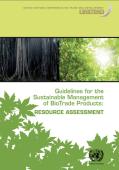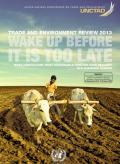The complex inter linkages between trade and climate change governance are increasingly recognised. Examples in point are emissions trading schemes, border carbon measures, and carbon labelling schemes, and various support measures for clean energy—all climate related policies with possible implications for trade and trade law. Against this background, this information note explores the potential for synergy and cooperation between the trade and climate change regimes. This paper will help those working on climate change to better answer questions such as: How can trade measures better address climate change mitigation? Can current climate response measures restrict trade? And how can a strengthened trade and climate governance make them more constructive?

These guidelines will focus on the assessment of managed resources by providing additional detail, key ecological concepts and methodologies for completing a resource assessment, and guidance to incorporate findings into management plans and monitoring systems.
The present document complements the guidelines developed by UNCTAD (2009) for the development and implementation of management plans for wild collected plant species used by organisations working with natural ingredients.
Section 2 will feature examples of applied resource assessments using specific case studies for three traded species based on two information sources: existing cases of UNCTAD BioTrade partners and examples from scientific publications or project reports.

Quoting a joint analysis undertaken by the OECD and the IEA, G-20 leaders committed in September 2009 to "rationalize and phase out over the medium term inefficient fossil-fuel subsidies that encourage wasteful consumption." This report draws on previous OECD work to assess the impact on international trade of phasing out fossil-fuel consumption subsidies provided mainly by developing and emerging economies. The analysis employed the OECD’s ENV-Linkages General-Equilibrium model and used the IEA’s estimates of consumer subsidies, which measure the gap existing between the domestic prices of fossil fuels and an international reference benchmark. It shows that a co-ordinated multilateral removal of fossil-fuel consumption subsidies over the 2013-2020 period would increase global trade volumes by a very small amount (0.1%) by 2020. While seemingly negligible, this increase hides the large disparities that are observed across countries (or regions) and products. Under the central scenario, which assumes a multilateral subsidy removal over the 2013-2020 period, trade in natural gas would be most affected, with a 6% decrease by 2020.
